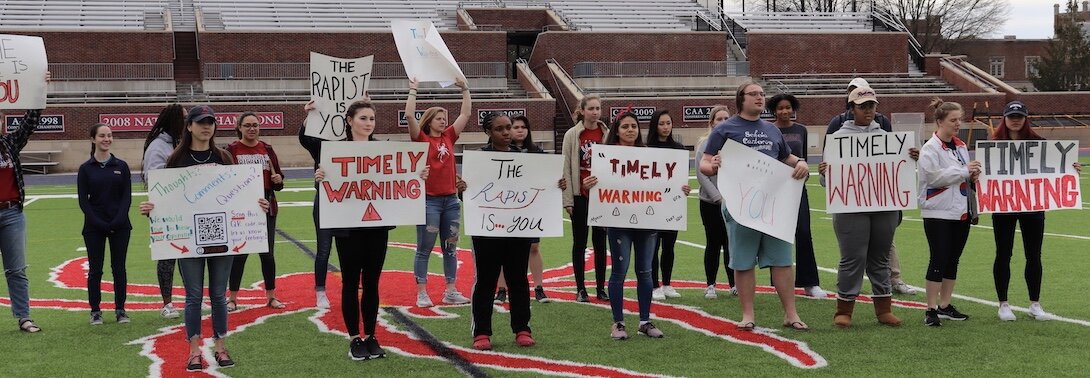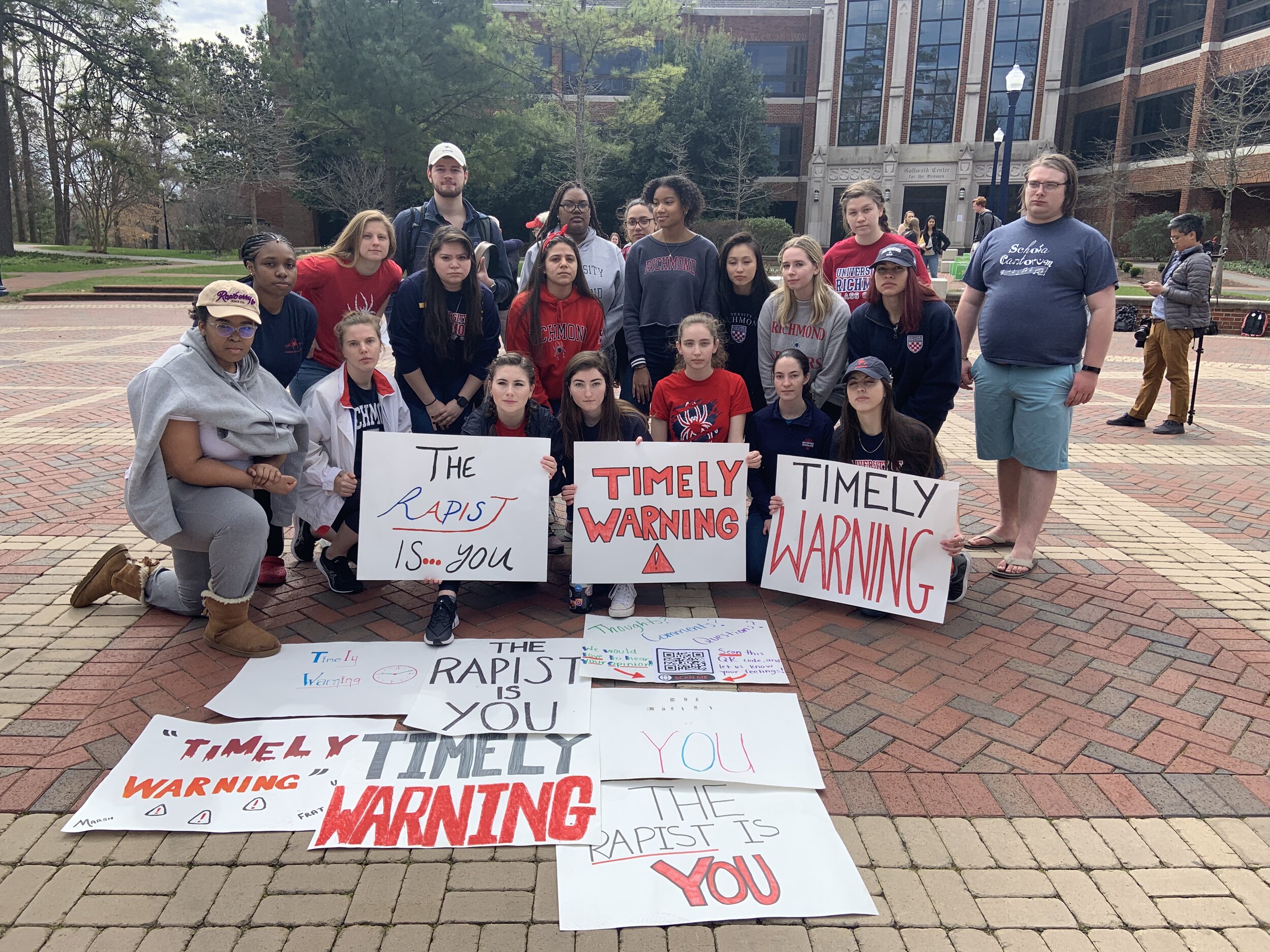
Un violador en tu camino / A Rapist in Your Path
Wednesday, March 4, 2020
To launch Women’s History Month, a series of feminist flash mob interventions took place at the University of Richmond on Wednesday, March 4, 2020 organized by professors Patricia Herrera and Mariela Méndez who team-taught the bilingual course “Gender, Race, and Performance Across the Americas.” These flash mobs were inspired by Un violador en tu camino, a performance-based protest against gender violence created by the Chilean feminist collective Lastesis. A Rapist in Your Path was first staged in Valparaíso, Chile, in 2019. Soon after, it went viral, and has been performed by women all over the world.
Students on their way to performing the flash mobs.
Students from six different classes were in charge of adapting the lyrics and selecting locations that spoke to their experiences and the incidents of racism and sexism at the University of Richmond.
The interventions occurred at three different times throughout the day. The first Flash Mob occurred by the parking lot near New Fraternity Row. On their way to the second location at the E. Claiborne Robins Statue, students spontaneously decided to perform the intervention at the Football Stadium. Participants walked through he International Center Courtyard chanting the lyrics until arriving at the E. Claiborne Robins Statue. After finishing the second intervention, participants walked through Tyler Haynes Commons chanting the lyrics until arriving at the Gottwald Center for the Sciences, where the latest case of sexual assault had occurred. Many students were shaken by this since it was the first time a sexual assault was reported at Gottwald, a space once considered to be safe to study at any time of the day.
Performance Video
Click on video to watch the performance.
Four Key Movements —
One
A lunge with crossed arms in front of their face expressed both defense and resistance.
Two
Hands covering ears and mouths signaled the administration's complicit silence.
Three
Finger pointing directly at all members of the community made visible how we all need to be held accountable.
Four
An elated, joyful improvised dance, also present in the original Flash Mob, becomes a true moment of liberation and defiance.









Spectators were provided with a handout including the lyrics, some context, and an invitation to participate by clapping, drumming, singing and holding up signs. PSMAs (Peer Sexual Misconduct Advisors) were available for support and a table with resources was set up at The Forum.
This was the last time we saw each other in person because of COVID, yet we could carry the collective energy forward into our Zoom meetings. The pandemic has taught us how to be a stronger and more resilient community. As a class, we understood how the current situation has also magnified inequities. Now more than ever we all need to center difference and practice equity in our everyday life. In that spirit, the video created shows how we need each other and our collective resistance to fight for a better UR and a more equitable world. We hope this Feminist Flash Mob Intervention inspires you, your own communities, and beyond.
Dr. Patricia Herrera talking to students prior to flash mobs.

This Feminist Flash Mob Intervention is modeled after the Chilean feminist collective Lastesis first presented on November 2019 in Santiago de Chile, as a form of protest against sexual violence. Since then, it has spread nationally and internationally.
We asked people to join us by chanting, dancing, holding a sign or keeping the beat with an instrument or by clapping.
Un violador en tu camino
El patriarcado es un juez
que nos juzga por nacer,
y nuestro castigo
es la violencia que no ves.
El patriarcado es un juez
que nos juzga por nacer,
y nuestro castigo
es la violencia que ya ves.
Es femicidio.
Impunidad para mi asesino.
Es la desaparición.
Es la violación.
Y la culpa no era mía, ni dónde estaba ni cómo vestía.
Y la culpa no era mía, ni dónde estaba ni cómo vestía.
Y la culpa no era mía, ni dónde estaba ni cómo vestía.
Y la culpa no era mía, ni dónde estaba ni cómo vestía.
El violador eras tú.
El violador eres tú.
Son los pacos,
los jueces,
el Estado,
el Presidente.
El Estado opresor es un macho violador.
El Estado opresor es un macho violador.
El violador eras tú.
El violador eres tú.
A Rapist in Your Way
Timely Warning
Patriarchy is our judge
That imprisons us at birth
And our punishment
Is the violence you don’t see.
Racism is our judge
That affects us all at birth
And the punishment
Is the violence you can see.
It’s assault.
White Supremacy
Toxicity in greek culture
It’s rape!
And it’s not my fault, not where I was, not how I dressed.
And it’s not a joke, not who I am, not where I am from.
And it’s not my fault, not where I was, not how I dressed.
And it’s not a joke, not who I am, not where I am from.
And the rapist is you
And the racist is you
It’s the students,
It’s the cops.
It’s the faculty.
It’s the donors.
This administration is complicit.
This administration is complicit.
And the rapist is you.
And the racist is you.
And the rapist is you.
And the racist is you.
Flash Mob Participants —
The following classes participated in the Flash Mob.
Gender, Race, and Performance Across the Americas
A bilingual class co-taught by Patricia Herrera y Mariela Méndez
Feminist Theories taught by Erika Damer
WILL Colloquium co-taught by Holly Blake and Melissa Ooten
Collaborative Arts Laboratory: Dance, Humanities and Technology co-taught by Alicia Díaz and Patricia Herrera
Queer Theories taught by Del McWhorter
Gender and Sustainable Development in Guatemala co-taught by Holly Blake and Mariela Méndez
Special Thanks —
Kaylin Tingle, Sexual Misconduct Prevention Educator
Peer Sexual Misconduct Advisors
Women, Gender, and Sexuality Studies Program
American Studies Program
Department of Theatre and Dance
Dean Mia Reinosa Genoni
Westhampton College Dean’s Office
Department of Latin American, Latino, and Iberian Studies
Office of International Education
Jannette Amaral-Rodriguez
Aurora Hermida-Ruiz
Dorothy Holland
Amy Howard
Elizabeth Kissling
Nicole Maurantonio
Lucretia McCulley
Martha Merritt
Jenny Pribble
Rafael de Sa
Patrick Schweiger
Kathleen Skerett
Joey Tran

